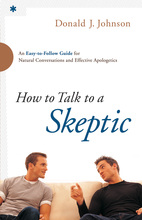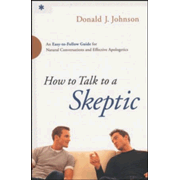With a title like How to Talk to a Skeptic, you would expect the author to address all of the typical questions likely to arise in those discussions. But Don Johnson takes a different approach. While the questions skeptics bring up are worth discussing—What about contradictions in the Bible?, Do you really believe that God actually wrote the ten commandments?, etc.—--these questions should not be the starting point. Johnson recommends bringing the discussion back to the underlying worldviews that address the really important questions such as Who is God?, Who or what is man?, and What happens to us when we die?
Maybe even more important, Johnson says that rather than arguing endlessly over peripheral questions, we should, "humbly and gently listen and ask questions in an attempt to learn as much as we can about what the skeptic believes and where he is coming from" (p. 46). Instead of pushing our own belief system, we should begin by first grasping then questioning the skeptic’s beliefs. Many times, the skeptic’s worldview has not been thought through, and asking questions helps them to arrive at logical conclusions on their own.
Johnson doesn’t try to address all of the questions skeptics are likely to have. Many other authors have done a thorough job in that department. But he does address some topics that frequently arise, generally bringing a fresh perspective and possibly even challenging what you think you believe. Among topics addressed in this fashion are the nature and purpose of worship and sacrifice, what it means to be born again, the “fairness” of heaven and hell, and the nature of the Bible.
Having read a number of books on apologetics, I was pleasantly surprised to find that How to Talk to A Skeptic takes a different approach that actually seems both practical and useful. It’s not necessarily easier, because listening to and understanding skeptics often require that we have sufficient background to grasp the relationship of ideas within different belief systems or worldviews as well as some understanding of human nature. We need to be able to spot when the real issue might be an inability to believe that God might love them because of childhood abandonment or other issues, or maybe a close-mindedness to rational discussion because of a commitment to a lifestyle choice that the skeptic knows doesn’t fit with Christianity. So, while Johnson advises shifting the discussion to the basic level of worldviews, he acknowledges that the other questions still need to be addressed at some later point in the discussion.
In summary, I expect that the result of this approach is likely to be much more successful evangelism since winning arguments isn’t the same as winning souls.
Note that Johnson also has a five-part video course on this same topic titled Personal Evangelization: How to Be a More Effective Witness to Your Faith. While the book is more comprehensive, Johnson covers many of the key ideas in the course. You can find it at the Don Johnson Evangelistic Ministries store by clicking here.










